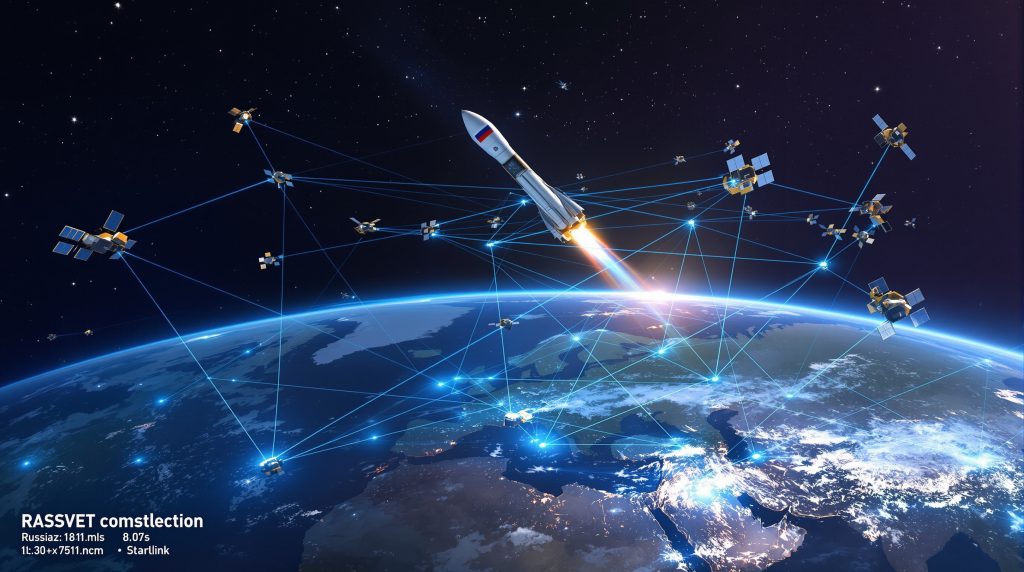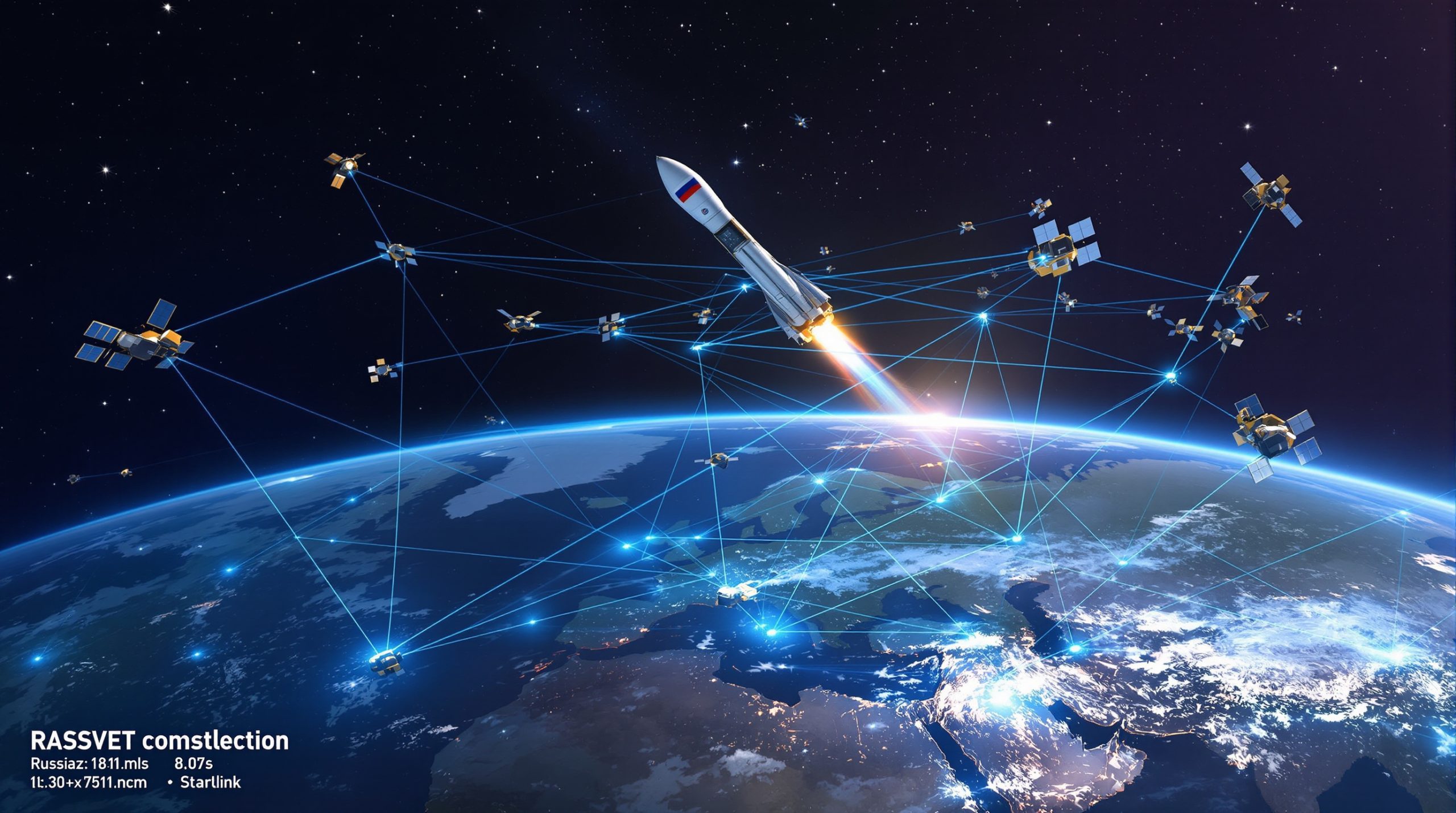Russia's Race for Satellite Dominance: Building a Starlink Alternative
Russia's space agency Roscosmos is rapidly developing a domestic satellite internet constellation called "Rassvet" (Dawn) through aerospace company Bureau 1440. This strategic initiative represents Moscow's response to Ukraine's battlefield advantage gained through access to Elon Musk's Starlink. The project aims to deploy hundreds of low Earth orbit satellites to provide global broadband connectivity, with the first launch scheduled for late 2025.
The name "Rassvet," meaning "dawn" in Russian, symbolizes what Russian officials hope will be a new era in the country's space capabilities after years of declining influence in the sector. As the US‑China trade war continues to reshape global technology competition, Russia is seeking its own technological independence.
Why Russia Needs Its Own Satellite Internet System
The Ukraine conflict has dramatically highlighted the strategic importance of satellite communications in modern warfare. A recent global Starlink outage affected "tens of thousands of people, including Ukrainian military forces across the entire frontline," according to reports from September 2025. This incident underscored Russia's vulnerability in this critical technology domain.
Ukraine's military has leveraged Starlink terminals throughout the conflict to maintain battlefield communications, coordinate drone strikes, and ensure command continuity even when ground infrastructure is damaged. This capability gap has pushed Russia to accelerate development of its own system as a matter of national security and technological sovereignty.
The Strategic Military Implications
- Battlefield communications independence from Western-controlled systems
- Enhanced command and control capabilities for remote operations
- Secure data transmission for intelligence and surveillance systems
- Support for unmanned systems and precision weapons guidance
Beyond Military Applications
- Digital connectivity for remote Russian territories across its vast geography
- Maritime communications for Arctic shipping routes becoming increasingly important
- Support for oil and gas operations in isolated Siberian regions
- Alternative satellite internet option for Global South nations seeking independence from Western systems
Technical Specifications and Deployment Plan
Russia's satellite internet system development follows a three-phase approach according to Roscosmos statements:
Satellite Architecture and Deployment Plan
- Initial constellation of 16 satellites launching in late 2025
- Expansion to 250 satellites by 2027 for commercial services
- Long-term goal of 900+ satellites in orbit by 2035
- Low Earth orbit positioning for reduced latency compared to traditional satellites
Dmitry Bakanov, the 39-year-old head of Roscosmos, stated in September 2025: "Several test vehicles in orbit have already been inspected and the production ones have been modified accordingly. We are also moving at a rapid pace in this direction." This focus on rapid development mirrors similar asteroid mining advances seen in other space technology sectors.
Technical Challenges and Innovations
While specific technical details remain limited in official announcements, the system is expected to incorporate:
- Advanced signal processing to compensate for Doppler effects
- Enhanced encryption for military applications
- Domestically produced user terminals and ground infrastructure
- Potential use of laser-based communication between satellites
Current Status and Progress
The project represents a renewed effort after an earlier satellite internet initiative called "Sfera," first unveiled by President Putin in 2018, had to be abandoned amid sanctions on Roscosmos. According to reports from Oil Price, Russia is attempting to fast-track development despite these previous setbacks.
Leadership Behind Russia's Satellite Internet Ambitions
The project is being spearheaded by Bureau 1440, a Russian aerospace company, under the supervision of Roscosmos. Dmitry Bakanov's appointment as head of Roscosmos signals Russia's recognition that its space sector needs fresh leadership to compete with SpaceX and other Western space companies.
Leadership Challenges
- Bakanov has publicly acknowledged Russia's space sector fell behind due to "inertia" and lack of fresh talent
- Current efforts focus on attracting younger engineers and scientists to revitalize the program
- Need to overcome Western sanctions affecting technology access
- Rebuilding Russia's reputation in space technology after years of stagnation
In a state TV interview, Bakanov emphasized his focus on bringing in a "younger generation of engineers and scientists" to breathe new life into Russia's space program.
Obstacles Facing Russia's Starlink Alternative
Technological Hurdles
- Sanctions limiting access to advanced microelectronics and components
- Limited domestic semiconductor manufacturing capability
- Need to develop specialized satellite production facilities
- Challenges in scaling production to match SpaceX's manufacturing pace
Economic Constraints
- Reduced state budget amid ongoing war expenses
- Limited private investment in Russian space ventures
- Higher per-satellite costs due to smaller production scale
- Competing priorities for defense-related funding
Launch Capacity Limitations
- Russia conducted only 17 space launches in 2024, compared to 145 by the US and 68 by China
- Aging launch infrastructure requiring modernization
- Limited launch vehicle options compared to SpaceX's reusable rockets
- Challenges in achieving the launch cadence needed for rapid constellation deployment
This launch capacity gap represents one of the most significant obstacles to Russia's satellite internet ambitions, as building a constellation requires frequent, reliable launches. The global mining landscape for materials needed for these technologies also presents additional challenges for Russia's space ambitions.
Russia's Broader Space Strategy
The satellite internet initiative represents part of Russia's effort to reclaim its historical position as a space power. The country that launched the first satellite (Sputnik) and first human into space (Yuri Gagarin) has seen its space leadership erode in recent decades as companies like SpaceX have revolutionized the industry.
Revival of Russian Space Ambitions
- Increased funding for space infrastructure modernization
- Development of new launch vehicles to replace aging Soviet-era rockets
- Focus on dual-use technologies with both civilian and military applications
- Efforts to reduce dependence on foreign technology
Geopolitical Positioning
- Offering satellite internet as an alternative to Western systems for Global South nations
- Developing space capabilities independent of Western supply chains
- Creating technological sovereignty in critical communications infrastructure
- Positioning Russia as a provider of essential services to allied nations
Global Implications of Russia's Satellite Internet System
The development of a Russian Starlink alternative could reshape the geopolitical landscape of satellite communications, creating a more multipolar space environment where nations have choices beyond Western-controlled systems.
Potential International Impact
- Alternative satellite internet option for countries facing Western sanctions
- Competition potentially driving innovation and lower costs globally
- New dynamics in space governance and orbital slot allocation
- Increased militarization of low Earth orbit
Comparison with Other National Satellite Internet Programs
| Country/Entity | Program Name | Current Status | Planned Satellites |
|---|---|---|---|
| Russia | Rassvet | Development, first launch late 2025 | 900+ by 2035 |
| China | Guowang/SatNet | Early deployment phase | 13,000+ planned |
| EU | IRIS² | Planning phase | 250+ planned |
| UK | OneWeb | Operational (partial) | 648 planned |
| US/SpaceX | Starlink | Operational | 5,000+ deployed, 42,000+ planned |
This growing competition in satellite internet constellations reflects the strategic importance nations are placing on space-based communications infrastructure. Furthermore, according to Pressbee reports, this represents a broader shift in how nations view space as a critical domain for national security.
Timeline for Russia's Starlink Alternative
According to Roscosmos statements, the development timeline includes:
- First satellite launch with 16 satellites: Late 2025
- Initial commercial services with 250 satellites: 2027
- Full constellation deployment of 900+ satellites: By 2035
Phased Deployment Strategy
- Initial focus on military and government communications
- Expansion to commercial services for strategic industries (oil, gas, maritime)
- Gradual rollout to consumer markets in Russia
- International service offerings to allied nations
While ambitious, this timeline reflects the urgency with which Russia views this strategic capability gap. These developments are part of broader industry evolution trends affecting technological competition globally.
The Changing Nature of Space Competition
The race to build satellite internet constellations highlights how space has become a critical domain for geopolitical competition. Unlike the Cold War space race focused on prestige achievements, today's competition centers on practical technologies with direct military and economic applications.
Evolution of Space Competition
- Shift from prestige projects to practical, dual-use technologies
- Increased role of private companies in Western space development
- Focus on commercial viability alongside strategic objectives
- Growing importance of space infrastructure for national security
The New Space Race Dynamics
- Multiple competing constellations rather than bilateral US-Russia competition
- Integration of space capabilities with terrestrial military systems
- Economic and commercial factors driving development alongside security concerns
- Blurring lines between civilian and military space applications
Frequently Asked Questions About Russia's Satellite Internet Development
Why can't Russia simply use existing satellite internet systems?
Western sanctions and security concerns make reliance on foreign satellite systems risky for Russia's strategic communications. The Ukraine conflict demonstrated how satellite internet access can be restricted based on geopolitical considerations.
How will Russia's system compare to Starlink in terms of performance?
While official performance specifications remain limited, Russia's system will likely prioritize security and reliability for military applications first, potentially at the expense of higher consumer bandwidth compared to Starlink's consumer-oriented approach.
What impact might this have on global internet governance?
The development of competing satellite internet systems could fragment global internet governance, potentially creating separate spheres of digital influence aligned with geopolitical blocs.
Could Russia's system be vulnerable to the same jamming issues as Starlink?
All satellite communication systems face some vulnerability to counter-space capabilities. Russia's system will likely incorporate enhanced security features designed specifically to counter electronic warfare threats.
Will Russian satellite internet be available to civilian users worldwide?
While initial deployment will likely prioritize Russian government and military needs, officials have indicated plans to offer services internationally, particularly to nations seeking alternatives to Western-controlled systems.
Conclusion: A New Chapter in Space Competition
Russia races to build its own Starlink rival amid Ukraine war represents more than just a technical challenge—it symbolizes the evolution of space as a contested domain where nations compete for strategic advantage. The success or failure of this initiative will have significant implications for Russia's future military capabilities, technological independence, and geopolitical influence.
As satellite communications become increasingly central to both military operations and civilian infrastructure, the outcome of Russia's Rassvet project may help determine whether the future of space-based internet services will be dominated by Western providers or become a more diverse landscape with multiple competing systems. Access to critical minerals energy security will also play a crucial role in determining which nations can successfully compete in this new space race.
Disclaimer: This article contains information based on announced plans and public statements. Actual development timelines, technical specifications, and deployment schedules may change due to technological, financial, or geopolitical factors.
Want to Discover Promising Mining Investments Before the Market?
Explore how to identify significant mineral discoveries and capitalise on them with Discovery Alert's proprietary Discovery IQ model. Visit our discoveries page to learn how historic mineral discoveries led to substantial returns for early investors.




